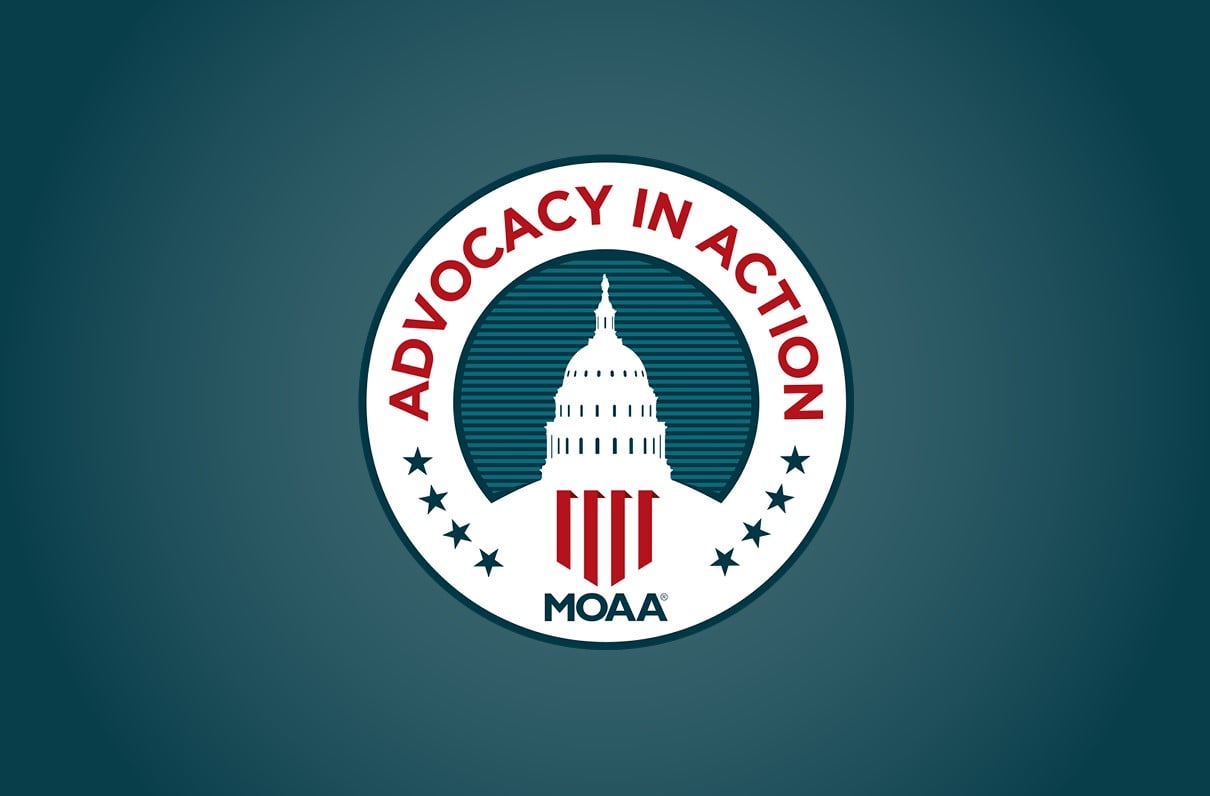The path to protecting the all-volunteer force amid a generational recruiting crisis begins with a simple message: We will honor the promises made to those who serve.
As MOAA begins its plans to return in-person to Capitol Hill for its yearly spring advocacy campaign, we’ve identified two critical issues where we are falling short on key promises. Issues where small changes will mean big improvements to the lives of servicemembers past and present. Issues where the DoD can begin to rebuild trust with all groups and stem the erosion of earned benefits.
Issues where members like you can make a difference.
Join MOAA’s Advocacy in Action this April as we send a clear message to lawmakers: Now is not the time to trim critical programs at the expense of those who need help the most:
- As servicemembers face skyrocketing rents and mortgage payments, it’s time to reverse cuts to the Basic Allowance for Housing, restoring the benefit to cover 100% of these expenses.
- As TRICARE Pharmacy users deal with drug shortages and high drug costs, it’s time to restore the thousands of brick-and-mortar pharmacies, including many locally owned shops in rural areas, to keep this crucial benefit strong.
[TAKE ACTION: Help MOAA Fight Cuts to the TRICARE Pharmacy Network]
At the end of April, MOAA will send teams of state council leaders to Washington, D.C., to meet with their legislators on the Hill. With those leaders will be members of MOAA’s Board of Directors and headquarters staff — a contingent of 225 people with sights on contacting every one of the 535 congressional offices.
We want to make the most of this opportunity to return to the Hill but we cannot rely solely on these visits — we need your help to increase our voice. You can make a remarkable difference from home before or after our AiA event.
[GET INVOLVED: How to Make Your Voice Heard]
More details on our primary goals for Advocacy in Action this year:
1. Restore Basic Allowance for Housing (BAH) to 100%
Our servicemembers give 100% in service to our country and they should not have to carry the additional burden of paying higher housing costs not covered by their allowance. Please help relieve stress on our military and help support recruitment and retention to sustain a strong all-volunteer force.
Background:
- In 2005, Congress eliminated servicemembers’ out-of-pocket (OOP) housing expenses, setting BAH at 100% of rental and utility costs.
- The 2015 NDAA, responding to budget pressures under sequestration, allowed DoD to reduce the rate to 95%, which was phased in 1% each year from 2015 to 2019. The DoD Budget Overview for FY 2015 noted this reduction of BAH would save the DoD $5 billion over five years.
- According to FY 2023 DoD tables, an E-5 with dependents will pay $1,332 a year OOP, on average. The average O-3 with dependents will pay $1,596 a year. Examples of higher ranks for those who served a 20-year career find a retired E-7 with dependents will have paid $30,240 in housing costs, and a retired O-5 with dependents will have paid $42,320.
It’s important to understand that DoD’s compensation strategy segments pay to help minimize tax liability for the member, and eventual retirement calculations favoring the government. As such, basic pay is typically set lower than for civilian counterparts with Basic Allowance for Subsistence and BAH separately allocated to specifically cover those costs in a mutually beneficial manner.
When 95% BAH does not cover housing and utility costs, which have skyrocketed based on inflation rates, the already lower basic pay or subsistence portions of the compensation package are forced to cover the difference. This leaves some military families stressed in other family budget areas such as food, clothing, child care, retirement planning. Etc. Military families should not have to prioritize and choose one necessity over another.
[RELATED: BAH Rates for 2023]
2. Reverse TRICARE Pharmacy Cuts
TRICARE Pharmacy network cuts, announced in late 2022, have created barriers to accessing prescription medications, particularly for the elderly, rural families, and those with serious medical conditions such as cancer, epilepsy, and multiple sclerosis.
Background:
- With the new pharmacy contract, the Defense Health Agency (DHA) slashed retail pharmacy network requirements as a cost-cutting measure. This enabled Express Scripts to offer contract terms to many pharmacies that reportedly didn’t even cover their costs. As a result, the TRICARE retail network has shrunk nearly 25% from approximately 55,000 to 42,000 locations.
- Most healthy families can readily switch to another local pharmacy for their occasional medication needs, but this cut has created access problems for many elderly beneficiaries, those in rural areas, and others with serious medical conditions.
- Beneficiaries with limited transportation and mobility challenges rely on the unique services and locations offered by independent pharmacies, including those serving long-term care facilities or located in medical provider settings such as hospital lobbies and oncology clinics. Many rural families now have to drive up to 30 minutes round trip, passing their former neighborhood pharmacy, to get to an alternate network location a hardship when dealing with an acute illness. Patients with serious medical conditions have reported challenges getting home infusion therapies, compound medications, and limited distribution drugs.
- If TRICARE’s reduced network requirements are allowed to stand, the pharmacy network could shrink by another 7,000 locations and still meet access standards. The Kroger family of stores has already severed ties with Express Scripts, and if their proposed merger with Albertson’s moves forward, the TRICARE network could shed another 1,700 pharmacies.
[RELATED: MOAA Leads Effort to Reverse Pharmacy Cuts]
How do these reductions in BAH and pharmacy support impact recruiting for our all-volunteer force?
All services are experiencing challenges with recruiting. The eligibility pool continues to shrink and the propensity to serve remains low, exacerbated by more than 54% of parents who do not recommend their child for military service. Military families are more inclined to recommend service; but in a 2021 poll, the Military Family Advisory Network found 62.9% of military or veteran families would recommend the military — down from 74.5% in 2019. Looking forward, Brookings reports a decline in birth rates that will likely not correct itself: in 2007, for every 1,000 women of childbearing age, roughly 70 gave birth; in 2020 that number was 56. No one should be surprised in 15 years that the pool of eligibles will be even smaller.
MOAA and other like-minded associations continue to be concerned about the continued erosion of service-earned benefits and the impact on recruiting. Making the servicemember cover 5% or more of their housing costs to save money for other DoD programs does not help servicemembers manage their finances and does not help the recruiter’s position with prospective recruits who hear about eroding benefits directly from their influencers. Additionally, changes in access to health care, enrollment fees for retirees, reduced access to pharmacies, and attacks on COLA won’t compel retirees to encourage someone to join the military.
These challenges, and others you know from your experiences, must be addressed by Congress through a strategic lens focusing on the recruiting process. In that effort, we must educate our legislators to understand this foundational question, “Are we, as a nation, keeping our promises to those who raised their hand to serve in the uniformed services?”
In addition to the two topics above regarding BAH and pharmacy access, coupled with a clear focus on recruiting as the most essential pipeline to our nation’s all-volunteer force, MOAA will prepare comprehensive fact sheets to articulate these issues, which we will leave with the congressional offices during our AiA visits. These fact sheets will also be available to all MOAA members via our website to help in any engagements you might be able to arrange while your legislators are home.
Add Your Voice to the Cause
Get involved and make sure your interests are addressed. Because the larger our voice is, the greater our impact will be.

